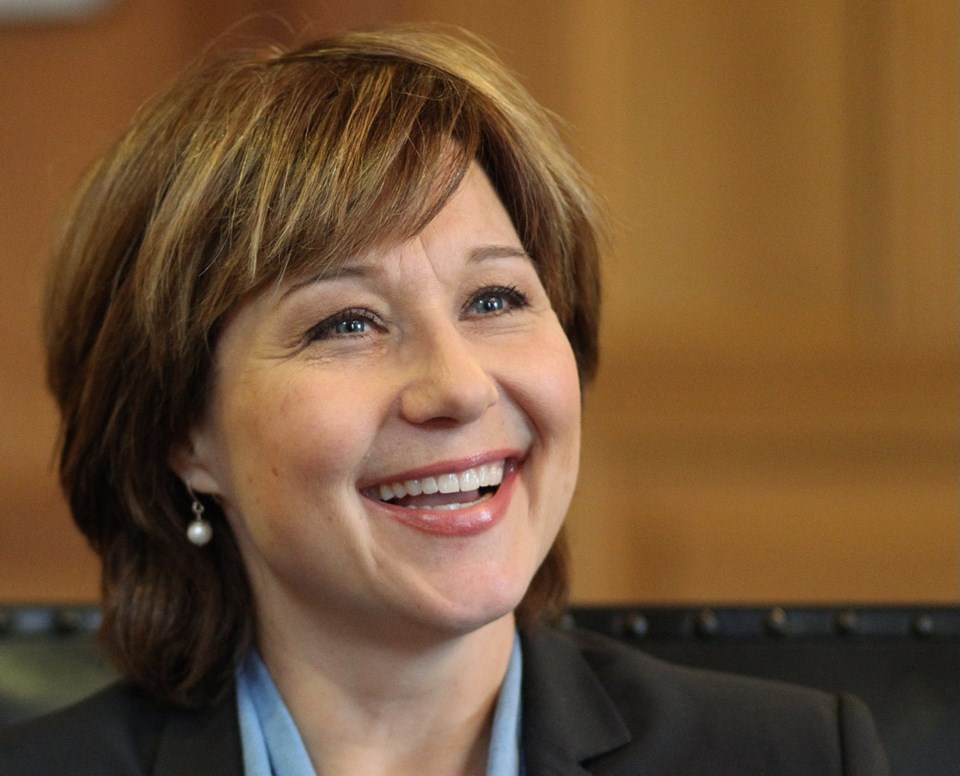VANCOUVER - The B.C. government's proposed path to a 10-year contract with teachers is a pre-election political document that aims to strip educators of their bargaining rights as they prepare to negotiate a new deal, says the head of the teachers' union.
"This is not good for students, it is not good for teachers," Susan Lambert said Thursday after Premier Christy Clark announced the proposal as a way to stop labour acrimony from disrupting the education system.
"I'm very upset that Christy Clark would try to use teachers, teaching and the public education system, and students, as a political football," Lambert said.
The proposal includes the creation of a policy council made up of the government, school trustees and the teachers' union to discuss issues that have historically bogged down negotiations, the government said.
But Lambert said teachers will not give up bargaining for hard-fought rights such as class size, noting a B.C. Supreme Court ruling in 2012 that gave teachers victory over that issue after a 10-year legal battle.
"It's ludicrous on the face of it, and it's quite sad that the government would use rhetoric of reconciliation and re-establishing respectful relationships and yet quite aggressively and relentlessly try to deny teachers their constitutionally guaranteed right to bargain working conditions," she said.
The Minister of Education Don McRae responded early Friday evening, saying in media release Lambert's conclusions were "false."
"The proposed framework offers no basis for this conclusion," he stated.
"The government and its education partners fully expect to negotiate class size and composition issues irrespective of the length of the agreement. Teachers have the right to negotiate class size and composition whether it is towards a two-year contract or a ten-year contract.
Clark said the 10-year deal would prevent labour acrimony from spilling into classrooms, adding a Grade 2 student could graduate from high school without the disruptions that have plagued public education in the province for decades.
The B.C. Teachers Federation and the province have waged a fight over various issues including wages, class size and education being deemed an essential service in 2001, meaning teachers could not go on strike.
The government also imposed two back-to-back contracts that added fuel to an already tense relationship between the two sides, prompting teachers to mount an illegal walkout in 2005.
Labour woes that lasted the entire school year starting in September 2011 meant teachers refused to write report cards, supervise students or take part in extra-curricular activities before a one-year contract was reached. It's set to expire at the end of June.
Clark, who is preparing for an election in May, said Thursday the deal would allow teachers to go on strike and would index their salary to the same increases given to nurses, college faculty and other public-sector employees.
"We have signed agreements with more than half of the provincial employees in British Columbia," Clark said. "And I believe that same spirit of co-operation can go a long way to making sure that we ensure a decade of labour stability for our kids in the education sector."
The government has also proposed to provide $100 million for an education investment fund in a 10-year deal and allow teachers a say in how the money is used in classrooms, said McRae, a teacher who is still a member of the teachers' union.
McRae said the negativity that has engulfed the teacher-government relationship must end for the sake of students."In the end, even with essential service, there was a 10-day strike," he said of the 2005 job action. "We don't want to, every two years, or every four years, go through this repeated cycle of labour angst. Since 1991 we've had eight series of this. That's too many times."
Lambert said McRae wrote letters to the government about classroom conditions when he was teaching.
"Now he's in government and he's got a different tune and a different story and that's very unfortunate," she said.
Lambert said the teachers' union has reached a tentative agreement with the B.C. Public School Employers Association, the government's bargaining unit, to facilitate the next round of negotiations and that both parties will be discussing ratification this weekend.
The government's proposal is a "heavy attempt" to intervene in that process, she said.
She said the teachers' union hopes to start contract talks on Feb. 4 if there is agreement on several issues, including the inclusion of a facilitator from the beginning of the process.
NDP education critic Robin Austin said the length of any agreement is typically negotiated at the bargaining table so he doesn't understand why the government has stipulated its proposed contract would cover 10 years.
Austin said he's also surprised the premier announced the proposal just before teachers are expected to ratify the framework for the next negotiated contract and start talks with the government's bargaining team.
When asked what an NDP government would do to ensure labour peace with the teachers' union, Austin said his government would "follow the law."


